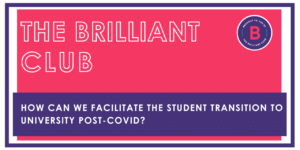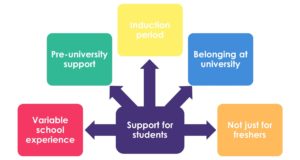
Authors: Hannah Thomson (Research & Evaluation Officer) & Julie Cummings (Public Affairs & Communications Officer)
A call for evidence
In light of the Covid-19 pandemic, it is crucial that action is taken to support students to make the best out of their remaining time at university and support those who are starting their journey in higher education. In June 2021, a public call for written evidence was issued by the UPP Foundation’s Student Futures Commission inviting students, student bodies, higher education institutions, and organisations working in the higher education sector to explore approaches that would help ensure students’ successful futures from September onwards.
To explore how we can help students transition to university post-covid, and in response to the call for evidence, The Brilliant Club recently hosted a virtual roundtable on this topic, bringing together practitioners with widening participation and student success backgrounds from secondary schools and higher education. In this blog we share the key issues raised and ideas for supporting students with both the academic and non-academic challenges as they transition to university. In particular, we focus on the following topics:

What have students missed out on?
Throughout 2020 and 2021, students have had variable school experiences, with fewer opportunities to learn study skills, exam techniques, and subject knowledge as a result of school closures and exam cancellations. Many students may therefore not be as ‘learning ready’ as they would be without the disruptions of the pandemic, which should be considered by university staff when teaching content, setting learning outcomes, and assessing the new cohorts (Pownall et al., 2021). The issue of missing out on A-level content is exacerbated by the different experiences pupils have had of remote learning. For example, a report by The Sutton Trust found that sixth form students from lower socio-economic backgrounds were twice as likely to not have had adequate access to stable internet connections, devices, and study spaces (Montacute & Holt-White, 2020), an issue that may well continue for students living at home during university.
Beyond A-level content, students transitioning to university during the Covid-19 pandemic may have fewer opportunities to access the ‘hidden curriculum’ of higher education. This ‘hidden curriculum’ usually refers to societal, educational, and institutional norms and rules related to university (Pownall et al., 2021). This knowledge is usually acquired in person before and during university, at applicant events, open days, and during the induction period, and often in informal settings amongst friends. It is therefore important to create virtual environments where students can find out about important aspects of university life, like financial support, using e-learning platforms, and how and where to ask for help if inductions are held online.
Providing meaningful pre-university support
In the roundtable discussion, the importance of supporting students’ learning before they arrive at university was emphasised. Some example university transition programmes include Isaac Physics and The Brilliant Club / Trinity College Cambridge Transition Project. Both programmes make use of online learning, academic support, and information about university, to enable students to engage in the kind of independent learning required when they begin their studies. Depending on the subject or course, this preparatory online learning could include banks of questions, problems, and videos or explainers to guide students through areas of difficulty.
The impact of school closures during the pandemic has made this additional support more important than ever, as students have missed different amounts of face-to-face learning. It was highlighted during the discussion that although there has been much focus on the education young people have ‘lost’ during the pandemic, they have also had a crash course in independent study which may set them up well for the level of work expected in higher education. The extent to which students have gained independent learning skills will vary widely between individuals and will depend on what resources they had available.
One suggestion for identifying what students have missed out on was to implement short tests to identify gaps in subject knowledge, not to put the burden on students, but to empower them by highlighting which topics may need more work. This could happen in supra-curricular support programmes before university and when students start university. Importantly, feedback on such tests needs to make sure students are supported by additional resources and not made to feel bad about a lack of knowledge.
A ‘long and skinny’ induction
Once students arrive at university, the first activities they take part in will be during an induction period. The roundtable raised the importance of not overwhelming students during this period in the context of the pandemic and adapting inductions to a ‘long and skinny’ model. This would involve providing the same information over a longer period of time, which is particularly important when all the content is delivered virtually, as it is harder to concentrate through a screen. Using students who transitioned to university during the pandemic last year as peer support for the incoming 2021 cohort was identified as a great opportunity, with mentoring schemes being rolled out on online platforms at several institutions. Providing such a space for incoming students to ask questions and discuss course content with older students presented a more personal side to preparing for university which was highly valued.
Additional office hours could also be a relatively cost-effective way to provide academic support without implementing entirely new programmes. Again, due to the nature of online interactions, roundtable participants emphasised the need for more deliberate feedback opportunities to establish what is and is not working. Signposting opportunities to give feedback to the university more frequently would allow higher education institutions to reflect best practice and adapt their programmes accordingly.
Belonging at university is not just a bonus
Feeling like you ‘belong’ at university is associated with lower drop-out rates and increased student success, so it should not just be viewed as a bonus to the university experience (Brady et al., 2020; Murphy et al., 2020; Thomas, 2012). A 2020 survey at a post-92 UK university found that lockdown reduced feelings of belonging in both staff and students, with physical presence on campus considered important by both. This held true for students from a diverse range of backgrounds (Mulrooney et al., 2020). Even before the pandemic, students from disadvantaged backgrounds report a less positive student experience in terms of social belonging (Mountford-Zimdars et al., 2015). Feeling that you ‘belong’ at university can be impacted by a lack of social connectedness, financial difficulties, and feeling that students have not ‘earned’ or ‘deserved’ their university place as it was decided by teacher grades rather than sat exams (Ramsey & Brown, 2018; Pownall et al., 2021).
In coming up with ways to support students’ sense of belonging during Covid-19, the importance of the induction period once again became clear during the roundtable. A successful induction should provide students with information to create confidence. This demonstrates that they ‘belong’ and combats imposter syndrome. An extended induction period that makes use of peer connection gives students more time to join extra-curricular activities, mentoring schemes, and academic workshops, and meet their peers in informal contexts. In an online world, consideration should be given to carving out virtual spaces for these all-important interactions to take place. Beyond the induction period, a roundtable suggestion from SOAS University was the ‘virtual corridor’, an online space where students can gather after lectures and talk about anything they may not have understood, mimicking the chatter that happens as students would normally file out of a lecture theatre. Knowing that their peers might not understand the same aspects of a course can make students feel more able to ask for help and increase peer connections and academic confidence.
It’s not just freshers that need support
Increasing a sense of belonging is relevant for incoming freshers as well as current first and second year students. It is important to remember that some students may not have visited their university campus yet despite starting in September 2020. Small things can go a long way in making students feel part of their university, such as small, branded gifts (Hausmann et al., 2009), and active encouragement to join extra-curricular societies. It is important to show students that the university does not just value academic success, but that welfare and community are just as important. A university’s values and diversity may have to be communicated more actively, as students are less exposed to life on campus, but a much smaller group of students and staff in online meetings. Student representation at an organisational level is therefore more important than ever.
Looking forward
The roundtable discussion highlighted the efforts being made by universities to support students transition to university in previously unimaginable circumstances, both in terms of their academic success and feelings of belonging at university. One of the main conclusions to emerge was the need to be flexible but deliberate in approaches to transition. The challenges students face in September 2021 will be different once again to those faced by the September 2020 intake. Likewise, as the national Covid-19 situation develops, the practical implications of social distancing will shape the way students learn and interact, making it more important than ever that they have opportunities to mix informally with their peers and provide feedback to the university.
Thanks to the roundtable attendees who contributed the ideas explored in this blog: Aimée Smith, Anne-Marie Canning, Dr Anton Machacek, Becky Allen, Billy Reed, Eireann Attridge, Jon Datta, Maggie Gray, and Meg Price.
References:
Brady, S. T., Cohen, G. L., Jarvis, S. N., & Walton, G. M. (2020). A brief social-belonging intervention in college improves adult outcomes for black Americans. Science Advances, 6(18).
Hausmann, L. R., Ye, F., Schofield, J. W., & Woods, R. L. (2009). Sense of belonging and persistence in White and African American first-year students. Research in Higher Education, 50(7), 649-669.
Montacute, R. & Holt-White, E. (2020). COVID-19 and Social Mobility Impact Brief #2: University Access & Student Finance. The Sutton Trust. Available at https://www.suttontrust.com/wp-content/uploads/2020/05/COVID-19-and-Social-Mobility-Impact-Brief-2.pdf
Mountford-Zimdars et al. (2015). Causes of differences in student outcomes. Available at https://dera.ioe.ac.uk/23653/1/HEFCE2015_diffout.pdf
Mulrooney, H. M., & Kelly, A. F. (2020). Covid 19 and the move to online teaching: impact on perceptions of belonging in staff and students in a UK widening participation university. Journal of Applied Learning and Teaching, 3(2), 17-30.
Murphy, M. C., Gopalan, M., Carter, E. R., Emerson, K. T., Bottoms, B. L., & Walton, G. M. (2020). A customized belonging intervention improves retention of socially disadvantaged students at a broad-access university. Science Advances, 6(29).
Pownall, M., Harris, R., & Blundell-Birtill, P. (2021). Supporting students during the transition to university in COVID-19: 5 key considerations and recommendations. Available at https://psyarxiv.com/4fykt
Price, M. (2021). Here’s how we can build student transition back in 2021. Wonkhe. Available at https://wonkhe.com/blogs/heres-how-we-can-build-student-transition-back-in-2021/
Ramsey, E., & Brown, D. (2018). Feeling like a fraud: Helping students renegotiate their academic identities. College & Undergraduate Libraries, 25(1), 86-90.
Thomas, L. (2013). What works? Facilitating an effective transition into higher education. Widening Participation and Lifelong Learning, 14(1), 4-24.